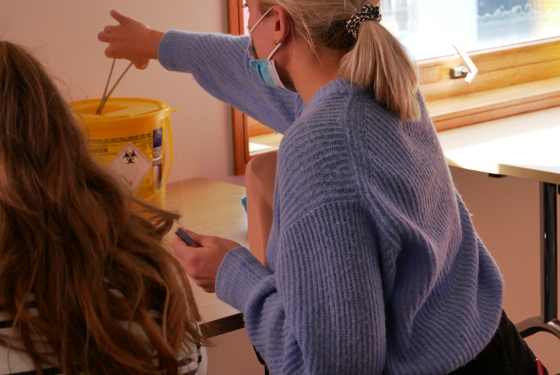Information for trainers on how the RCOG maintains quality in postgraduate medical education
- Quality strategy for training – how the RCOG supports the delivery and development of quality in postgraduate medical education
- Externality process – how the RCOG uses external experts to improve the quality of specialty training in O&G
Quality strategy for training
Royal colleges have a clear role in supporting quality management in postgraduate medical education (PGME). The General Medical Council (GMC), the postgraduate training regulator, provides guidance.
To ensure women receive safe care of the highest quality, the RCOG strongly believes that educating and training junior doctors to a high standard is vital. The RCOG aims to promote high-quality education and training through a variety of methods and resources. The RCOG has a quality management strategy whose main elements are:
- Curriculum development and assessment framework
- Agreed training standards
- Quality-assured exam structure
- Externality process
- Training and education of trainers
- Trainee feedback
- Public involvement
- Annual specialty report
By working in these areas, with enthusiastic and appropriately trained trainers in O&G, the RCOG seeks to positively influence the training of future O&G specialists.
Curriculum development and assessment framework
The RCOG develops the specialty and subspecialty curricula ASMs, which are then scrutinized and approved by the GMC. The curriculum describes the areas of both clinical and non-clinical competences that must be achieved to gain a Certificate of Completion of Training (CCT), which allows specialist registration and the opportunity to apply to become a consultant in the NHS.
The RCOG regularly reviews the curriculum, actively taking feedback through public engagement, to ensure the curriculum requirements are up to date and relevant to clinical practice. The curriculum includes non-clinical aspects of medicine, in recognition of the importance of developing non-clinical skills for all trainees. The RCOG has developed workplace-based assessments to support the curriculum, which are reviewed regularly to ensure suitability. This structure is managed through the RCOG Curriculum Committee.
There are also 4 subspecialty training programmes with defined curricula and assessment processes. Trainees in these programmes undergo an individualised review process by external specialists to ensure progress towards subspecialty certification. The RCOG Subspecialty Committee manages subspecialty training.
Agreed training standards
Deaneries coordinate the delivery of training by managing specialty training programmes and reviewing trainees’ professional and clinical competency progress through the Annual Review of Competence Progression (ARCP) process.
To ensure consistency of training, with trainees being managed in a similar fashion across deaneries, the RCOG has created a training matrix outlining the annual expectation of educational progression, and guidelines for use of this matrix in the ARCP process. These resources have been developed by consensus with the Heads of School and managed through the RCOG Speciality Education Advisory Committee.
Quality-assured exam structure
Attainment of the MRCOG exam is highly regarded and a requirement for progress within training. The RCOG has established a quality-assured exam structure for the Part 1 MRCOG, Part 2 MRCOG and Part 3 MRCOG, which is a requirement of the curriculum.
The MRCOG exams test the knowledge base of trainees in a clinical context. The process is regularly reviewed and there is a built-in quality assurance structure. The Examination and Assessment Committee is responsible for exam content and management of the different elements that contribute to the exam. This committee reviews the standard-setting process and undertakes a detailed analysis of each exam as part of a quality management process. Trainees who do not pass the exam may receive individualised feedback. Information about curriculum changes, exam processes and pass rates are provided to deaneries and the GMC.
Externality process
Deaneries are responsible for the management of trainees and have a quality control/management role, as described by the GMC. The GMC requires deaneries to include externality within their processes to ensure objectivity. The RCOG facilitates the involvement of external experts and collates feedback through a set of standardised forms.
External assessment is required at a subset of ARCPs and deanery visits (usually triggered visits, although occasionally at routine visits). Through this process, the RCOG can identify issues within deaneries and help develop solutions and share good practice. If significant concern is identified, the external assessor is advised to raise this directly with the Postgraduate Dean in that deanery. If the issue is not resolved, the assessor can raise this with the GMC through the GMC’s Response to Concerns process. The RCOG, through the information it receives, can also raise issues with the GMC.
This process is managed through the Specialty Education and Training team and SEAC. For more information, read the RCOG’s principles and processes for externality in specialty education and training.
Training and education of trainers
Assessment of trainees is important as it provides trainees with feedback on their development as they progress through training. Good assessment leads to higher-quality training. The RCOG provides educational resources for trainers to promote their development within their trainer roles. These resources include training courses, e-learning materials and other guidance – for more details visit the main trainer resources page.
Trainee feedback
Although the GMC provides substantial data through the annual GMC National Training Survey, the RCOG believes additional targeted data are needed to be able to identify trends around practical delivery of the curriculum, in addition to trainees’ perceptions of national training. The survey is developed and analysed by the RCOG Trainees’ Committee and is a useful resource for addressing quality of training within O&G.
Public involvement
The GMC has provided detailed mandatory standards for involving patients and lay persons in the development, updating and reviewing of the curriculum, and the development, implementation and use of assessments within training programmes. The RCOG Women’s Network coordinates lay representation on several RCOG education committees, including the Curriculum Committee, SEAC and the Examination and Assessment Committee. This ensures the patient’s perspective is consulted for all aspects of curriculum and assessment within the training programme. Through this collaboration, the RCOG aims to develop a high-quality training programme with patient care at its centre.
Overseas training
The RCOG has a global responsibility to ensure high-quality care for women, and is actively involved in promoting education and training for all specialists through the Centre for Women's Global Health.
The RCOG has a process for accreditation of overseas centres for Special Interest Training Modules (SITMs), to promote the development of specialist skills which are equivalent to the training offered in UK centres.
Overseas specialists can sit the MRCOG exam and this is increasingly being undertaken in centres outside the UK.


Specialty training in O&G
Overview of the specialty training programme in O&G, including assessment and certification of training
